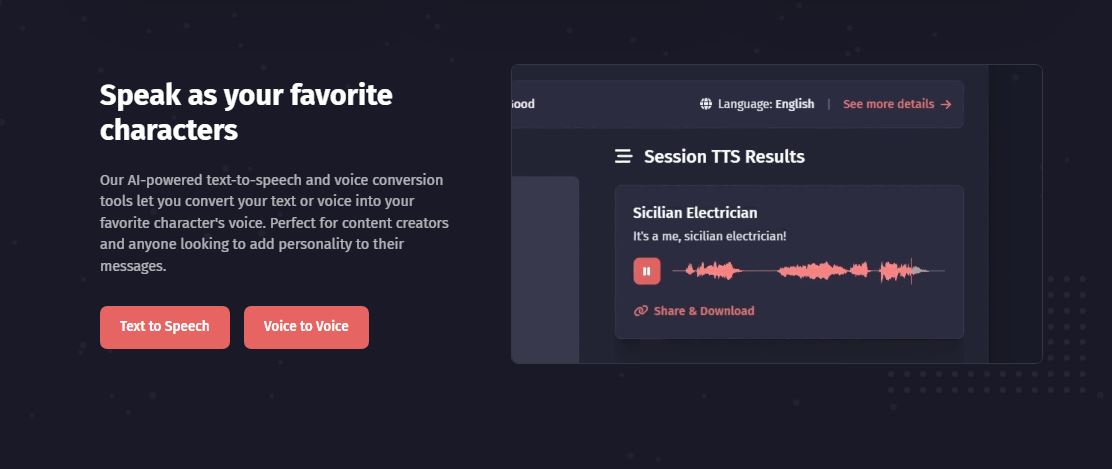Fakeyou Ai Text To Speech Review :Fakeyou.Com Voice Over Indepth Review, Pricing, Tutorials

Are you curious about the latest advancements in AI technology? Look no further than FakeYou – a deep fake text-to-speech tool that is making waves in the entertainment and media industries. With its advanced algorithms, FakeYou can create realistic-sounding voices that are difficult to distinguish from real human speech.
But this controversial app isn’t just for harmless fun. Some people are using it for malicious purposes, such as spreading fake news or creating false audio evidence. In this article, we’ll provide an in-depth review of FakeYou, including its pricing, tutorials, and ethical implications. We’ll explore both the potential benefits and drawbacks of this tool, and discuss how it could impact the future of audio technology and media production. So buckle up and get ready to dive into the world of FakeYou!
Fake You Key Takeaways
- FakeYou is a deep fake text-to-speech tool that uses advanced technology to create realistic-sounding voices.
- The app can be used for entertainment, education, and research, but also raises ethical concerns related to fake audio creation and potential for misuse.
- The tool requires JavaScript to be enabled to run and may have limitations in language and accents.
- The use of deep fake technology is controversial and poses a threat to democracy, but efforts are being made to develop countermeasures to combat it.
What is FakeYou?
If you’re wondering what FakeYou is, it’s a deep fake text to speech tool that uses advanced technology to create realistic human-like voices for various purposes. With this app, you can generate synthetic speech that sounds like a real person, and even create fake voiceovers for videos or phone calls. It’s easy to use and accessible online, but keep in mind that JavaScript needs to be enabled in order for the app to run.
FakeYou operates using deep learning technology that has been trained on large datasets of human speech. This allows the app to analyze patterns and nuances in language and tone, producing audio that closely resembles natural human speech. The mechanism behind this process involves mapping phonemes (the smallest units of sound) onto spectrograms (visual representations of sound waves), which are then used by neural networks to generate speech.
The result is a tool that can be used for entertainment purposes such as creating funny voiceovers or generating custom audiobooks. However, there are also concerns about the potential misuse of FakeYou and other deep fake technologies for spreading disinformation or committing fraud. As such, it’s important to consider the ethical implications of using these tools before deciding whether or not they’re right for your needs.
With this understanding of what FakeYou is and how it works, let’s dive deeper into its features and pricing options.
Technology and Mechanism
You may be surprised to learn that deep fake technology has been used for more than just entertainment purposes. In fact, a reported 96% of CEOs surveyed have expressed concern about the potential harm caused by deep fakes in their organization. This is because deep fake technology can be used for malicious purposes such as spreading disinformation, committing fraud, and manipulating public opinion.
The mechanism behind FakeYou’s text-to-speech conversion involves using advanced AI algorithms to analyze and mimic human speech patterns. This allows the app to create realistic-sounding voices that can be difficult to distinguish from real ones. The app also uses machine learning techniques to improve its accuracy over time.
Despite its potential for misuse, there are also legitimate uses and applications for FakeYou’s technology. For example, it can be used to create voiceovers for videos or audiobooks, or to make content more accessible for people with disabilities. However, it is important to use this technology responsibly and ethically.
In the next section, we will explore some of the different ways in which FakeYou’s text-to-speech conversion can be applied.
Uses and Applications

Get ready to discover the countless ways you can use deep fake text-to-speech technology in your daily life! Whether you’re creating voiceovers for videos, audiobooks or even just having fun with friends, FakeYou’s advanced AI technology allows you to produce realistic human-like voices that are sure to impress. With its user-friendly interface and customizable options, this tool is perfect for anyone looking to add a personal touch to their audio content.
However, it’s important to note that the use of deep fake technology raises ethical concerns related to fake audio creation. Misusing this tool for spreading misinformation or creating fake news can have serious consequences on society as a whole. It’s crucial that we all take responsibility for our actions when using such powerful technologies. As users of deep fake text-to-speech technology, we must be mindful of how we are contributing to the spread of information and ensure that we are not causing harm.
Despite these concerns, there are legitimate uses for FakeYou as well. For example, individuals with disabilities may find it easier to communicate using synthetic speech generated by this tool. Additionally, businesses may benefit from using this tool for voiceovers and other marketing materials. When used responsibly and ethically, deep fake text-to-speech technology has the potential to enhance accessibility and creativity.
While there are numerous applications for deep fake text-to-speech technology like FakeYou in entertainment and education, it’s important that we remain aware of its potential dangers and act responsibly when utilizing it. In the next section about ethical concerns related to this technology’s use in society, we will explore these issues more deeply.
Ethical Concerns
Exploring the ethical concerns surrounding the use of deep fake text-to-speech technology can shed light on the potential harm it could cause and how to responsibly utilize it. Here are 4 key points to consider:
- Misinformation: Deep fake text-to-speech technology has the potential to create highly realistic audio that is difficult to distinguish from real voices. This poses a threat in terms of spreading misinformation, creating fake news, manipulating public opinion, and potentially even interfering with democratic processes such as elections.
- Privacy: The use of deep fake text-to-speech technology raises serious privacy concerns, particularly when it comes to voice impersonation. People’s voices could be used without their consent for fraudulent purposes or even revenge porn.
- Use Cases: While there are legitimate uses for deep fake text-to-speech technology such as improving accessibility for people with disabilities or generating synthetic speech for videos or audiobooks, the potential misuse of this technology cannot be ignored.
- Responsibility: As with any new technology, those who create and use deep fake text-to-speech tools have a responsibility to understand its implications and ensure it is not being used maliciously or irresponsibly.
Considering these ethical concerns highlights the importance of responsible use of deep fake text-to-speech technology moving forward. However, it’s also important to keep in mind that this tool has limitations and requirements that users must adhere to in order to avoid negative consequences.
Fake You Limitations and Requirements
There’s a catch to utilizing deep fake text-to-speech technology effectively, as it has its limitations and requirements like a delicate instrument that must be handled with care. One of the most notable limitations is language and accent support. Some tools may only offer support for certain languages or accents, which can limit their usefulness for users in different regions or countries. Additionally, some tools require technical knowledge to use properly, which can be a barrier for those without a background in programming or artificial intelligence.
Another requirement for using deep fake text-to-speech technology is enabling JavaScript on your device. This is necessary because the tool runs entirely online and requires access to your browser’s resources. Without JavaScript enabled, you won’t be able to use the tool at all.
Some deep fake text-to-speech tools may require a fee or subscription to access all features. This can be an important consideration for users who want more advanced options or better quality audio output.
Despite these limitations and requirements, many individuals and businesses are still finding value in using deep fake text-to-speech technology for various purposes. However, it’s important to weigh the benefits against potential ethical concerns before deciding whether or not to use such tools.
Now let’s move on to discussing competitors and reviews of deep fake text-to-speech technology without missing a beat.
Competitors and Reviews
If you’re in the market for a deep fake text-to-speech tool, you may want to check out some of the competitors and read through user reviews to get a better idea of which ones are worth your time. While FakeYou is one of the most popular options available, there are other tools out there that offer similar features and may be more suitable for your needs. Some of these competitors include Lyrebird AI, Descript, and Replica Studios.
Lyrebird AI is a deep learning platform that specializes in voice cloning and text-to-speech conversion. It allows users to create custom voices from just a few minutes of recordings and has been used by companies such as AT&T and Intel. Descript is another tool that offers advanced audio editing capabilities along with its text-to-speech function. It allows users to edit audio files like they would edit a document using its innovative ‘Overdub’ feature.
Replica Studios focuses on creating high-quality voiceovers for video games, animations, and films. Its technology uses machine learning algorithms to create realistic human-like voices that can be customized based on tone, pitch, and emotion. Each competitor has its own unique strengths and weaknesses so it’s important to do your research before making a decision.
By exploring different options and reading reviews from other users, you can gain insight into what each tool has to offer as well as potential limitations or challenges. This will help you make an informed decision about which tool is best suited for your needs. Looking ahead, deep fake technology continues to evolve rapidly with new applications emerging all the time – including both positive use cases like accessibility improvements as well as negative implications around deception or manipulation – so it’s important to stay up-to-date on developments in this field regardless of which specific tool you choose.
Fake You Future Implications
The future of deep fake technology is rapidly evolving, with new applications emerging that have both positive and negative implications for society. On one hand, deep fake technology can be used to create more realistic and immersive experiences in entertainment, education, and various industries. For example, it can be used to create personalized virtual assistants that sound like real people or to enhance the quality of audio recordings.
On the other hand, deep fake technology also poses significant risks for society. As the technology becomes more advanced and accessible, it can be used to spread disinformation, manipulate public opinion, commit fraud, and harm individuals’ reputations and privacy. This has raised concerns about the need for regulation and accountability in the use of deep fake technology.
There are ongoing efforts to develop countermeasures against deep fakes and improve detection methods. However, this is a complex challenge that requires collaboration between experts from various fields such as computer science, law enforcement agencies, media organizations, civil society groups, and policymakers.
Ultimately, the future of deep fake technology depends on how it is developed and used by individuals and organizations around the world. It’s important for everyone to stay informed about these developments as they unfold so that we can make informed decisions about their potential impact on our lives.
Frequently Asked Questions
How does FakeYou compare to other deep fake text to speech tools in the market?
Compared to other deep fake text-to-speech tools in the market, FakeYou stands out for its advanced technology that can create highly realistic and human-like voices. However, it also faces competition from similar tools that offer comparable features and pricing. The use of deep fake technology in general is controversial and raises ethical concerns about its potential misuse for spreading misinformation or committing fraud. Therefore, it’s important to consider the implications and possible risks before using any deep fake tool, including FakeYou.

What are some potential legal implications of using FakeYou to create fake audio?
Using FakeYou to create fake audio may have potential legal implications. Depending on how the tool is used, it could potentially infringe on copyright laws or be considered defamation. Additionally, if the fake audio is used for malicious purposes such as spreading misinformation or committing fraud, it could lead to legal consequences. It is important to consider the ethical and legal implications of using deep fake technology and ensure that it is being used responsibly and within the bounds of the law.
Can FakeYou be used for more serious purposes such as creating evidence for legal cases?
Yes, FakeYou could potentially be used for creating evidence in legal cases, although it would depend on the specific circumstances and the legality of using deep fake technology in a court of law. For example, if a person had audio recordings that they claimed were evidence of someone confessing to a crime, they could use FakeYou to create a more convincing version of those recordings. However, this would likely be illegal and unethical. In addition to the potential legal consequences, using deep fake technology in this way could also undermine public trust in the justice system and lead to further concerns about the impact of technology on society.
Are there any notable cases where FakeYou has been used for malicious purposes?
Yes, there have been notable cases where FakeYou has been used for malicious purposes. The app’s ability to create realistic human-like voices has led to concerns about its potential for spreading misinformation and creating fake news. Some experts have warned about the tool’s potential for fraud, disinformation, social engineering attacks, phishing scams, ransomware attacks, cyberbullying, and revenge porn. Additionally, FakeYou has been used to create fake celebrity endorsements and political speeches. The ethical implications of deep fake technology are a topic of ongoing debate as it continues to evolve and be used in various ways.
How does the use of deep fake technology in tools like FakeYou impact the future of the media and communication industry?
The use of deep fake technology in tools like FakeYou has significant implications for the future of the media and communication industry. As deep fake technology continues to evolve and become more advanced, it becomes easier to manipulate audio content, making it difficult to distinguish between real and fake voices. This poses a threat to democracy as it can be used for spreading misinformation and creating fake news. Additionally, there are ethical implications surrounding the use of this technology, including privacy concerns and potential harm caused by impersonation or fraud. The responsible use of deep fake technology is essential in ensuring a safe and trustworthy media environment.
Conclusion
So, there you have it – an in-depth review of FakeYou. You now know all about its advanced AI technology and how it can be used for both entertainment and malicious purposes. You’ve learned about the ethical concerns surrounding this tool, as well as its limitations and requirements.
But what does the future hold for audio technology and the media industry? With tools like FakeYou available to anyone with an internet connection, we can expect to see even more fake news and misinformation in the years to come. It’s a scary thought, but also an exciting one – who knows what new technologies will emerge in response to this challenge?
One thing is certain: FakeYou is a game-changing tool that has already had a significant impact on our world. Whether you use it for fun or for something more nefarious, there’s no denying its power. In fact, it’s almost like having your own personal army of voice actors at your fingertips – an exaggeration perhaps, but not by much! AI Tech Reviews On The Tech Index















